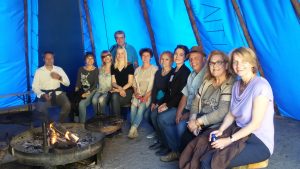„Productive Learning in Vocational Education“ (Proved)

PROVED was a two-year project from 01 September 2014 until 31 August 2016 carried out in Finland, Germany, Greece and Lithuania.
The main aim of PROVED was to promote a higher employment rate among youth and young adults, to reduce the rate of drop-outs of the vocational education system and in that way to fight poverty and social exclusion of young disadvantaged people.
The more strategic project aim was to transfer the principles of Productive Learning from the field of general education to that of vocational.
The experiences of the successful VET systems in Finland and Germany and the innovative ideas of PL were the basis for the development of an attractive pedagogical program for young disadvantaged people between 16 and 33, offering more practical experience in real life working situations while considering the specific needs and interests of the individual. With regard to the needs and demands of the VET systems in the countries involved, each vocational training institution involved developed, tested and implemented its own adapted PL concept. In doing so, PROVED significantly improved the VET systems in the participating countries.
In Germany, 92 secondary schools offer PL, and more than 10.000 students who were at risk of dropping out of the school system participated so far. The majority left with a school certificate and with a clear vocational path forward. During the most recent years, PL was also implemented in secondary schools in Finland and Lithuania.
The leading aspects for the concept development were the following principles of Productive Learning :
- Learning in real life situations / learning-on-the-job
- Individualisation of the learning process
- Connecting theory and practice
- Combining general education and vocational orientation
Due to the specific situations in the participating countries the vocational education institutions involved in PROVED focussed on different aspects of Productive Learning: In particular, in Greece and Lithuania there is no tradition of practical learning in companies or public institutions. Vocational education is organized as a full-time school-based training whereas in Germany there is a very long tradition of the so-called dual system of vocational training that combines workplace training and vocational school. Similarly, in Finland there are many innovative forms of vocational training but school-based-training is most common.
The consortium of PROVED consisted of eight partner institutions from Finland, Germany, Greece and Lithuania, working in the field of general, vocational or non-formal education, experienced in project and curriculum development, in community education, in teacher training or in teaching (in secondary schools or at VET). Six partner institutions are members of the International Network of Productive Learning Projects and Schools (INEPS) – two of them became project partners of PROVED. Five partner institutions – three Vocational Schools, one Training Center and one Adult and Youth School – directly applied the developed concepts of the program.
The main project activities were theory development and implementation, the design of a teacher training proposal including the development of different materials, the training of the teachers involved and the preparation of the mentors in practice, four transnational meetings, an internal and external evaluation of the project, the documentation and dissemination of all activities and results, and a quality management review of the cooperation between all partners and important stakeholders, especially companies in the region.
The main intellectual output of PROVED are five adapted PL concepts. Closely connected with this intellectual output are the following products:
- A Teacher Training Concept and Program,
- A Study Letter “Vocational Orientation through Productive Learning & Productive Learning in Vocational Training in different European Countries”,
- A manual with pedagogical material outlining the work and principles of PL in the framework of vocational education,
- A hand-out for Mentors in Companies participating in the PROVED model,
- “What is PL?” introduction
Sixty-five disadvantaged young people between 16 and 33 tested the adapted PL concepts in the second project year. The most significant impacts for the youth and young adults are: motivation to continue the learning process, more clarity concerning individual skills and interests, a better idea of the work demands in the world, specific skills development necessary in the job market, broader vocational perspectives and more economic independence (see results of the external evaluation).
Twelve teachers participated in a teacher training program, including international and national seminars, school-based training, self-study units using the developed Study Letter and material concerning the topic “Digital Learning in PL”. The main impacts for the teachers involved was more knowledge about the VET systems in Finland, Germany, Greece and Lithuania and about PL, professional development and improved methodologies, more job satisfaction, better chances in the working field of VET and more international contacts and exchange.
The tenets of PL (“Learning in real life situations”) require close cooperation with companies and other institutions, especially in those countries without a tradition of collaboration between the worlds of education and work. Depending on the different concepts the vocational training institutions established between two and 21 sustainable cooperations mainly with companies offering practical places. The main impacts for the local economy and for mentors in practice are better educated young people, the possibility to “test” young people in practice, more knowledge about PL, a better understanding of the needs of disadvantaged young people and improved methodical skills in counselling young people in their learning process.
The main benefit for the institutions which were part of the consortium is an expanded pedagogical profile or expertise in the field of vocational education and a deeper cooperation at regional (in particular with enterprises), national (with the ministries and networks working in VET) and international levels (especially between the participating countries and in the frame of INEPS).
In conclusion, PROVED was a successful project with a high impact on the young people involved, for the cooperating companies, for the partners of the consortium and also for the VET system itself; this way PROVED also contributes to the development of the European Qualification Framework (EQF). It is a sustainable model, and the external evaluation demonstrates: the young disadvantaged people who participated in the project are better prepared for the labour market, the teachers trained in the framework of PROVED are now multipliers for their regions, all products and methods can be used by institutions which are interested in implementing PL, cooperation with enterprises is established and the adapted PL concepts are tested and implemented.
Find the results of the project on this website:
